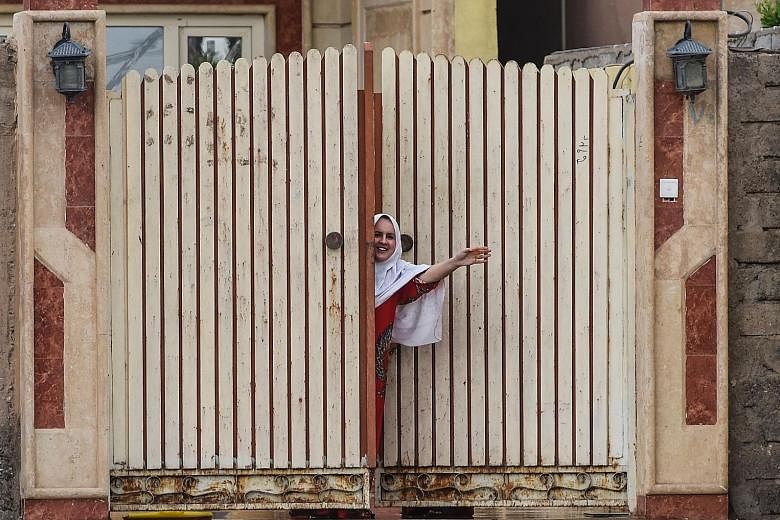MOSUL • For the first time in more than two years, residents of eastern Mosul enjoyed a day without ISIS.
As Iraqi security forces drove on the muddy streets of the neighbourhood on Wednesday, families stepped from the gates of their driveways, waving, flashing two-fingered victory signs and yelling, "Heroes!"
Others held white flags.
Some men were smoking and others had cigarettes tucked behind their ears - celebrating the Iraqi forces' victory over the Islamic State in Iraq and Syria in their neighbourhood by savouring some of the small freedoms that had been banned under more than two years of militant rule.
"We are very, very happy," said one man, Mr Qais Hassan, 46, surrounded by soldiers.
"Now we have our freedom."
ISIS, he said, asked them "to implement religion, but it had nothing to do with religion".
The victory by Iraqi counter-terrorism forces in this eastern neighbourhood of Mosul was a promising moment. But most expect that there will be long and intense fighting ahead before the entire sprawling city is reclaimed.
Mr Hadi al-Amiri, leader of the largest militia Badr Organisation, said Iraq's Popular Mobilisation Shi'ite forces aimed to cut the western supply route out of Mosul yesterday.
"Today, God willing, is the completion of the first stage of the Hashid (Popular Mobilisation) operations - that is, cutting the supply route of the enemy between Tal Afar and the Muhalabiya district," he told Iraqi television.
Tal Afar lies about 55km west of Mosul, on the way to ISIS-controlled regions of neighbouring Syria.
The Iraqi special forces in the area of eastern Mosul went door to door on Wednesday looking for weapons, booby traps and ISIS fighters. They were also trying to keep order as entire families, with backpacks and suitcases in tow, streamed in from neighbourhoods still controlled by ISIS.
The men were mostly fixated on three things: the big beards they had been forced to keep, the cigarettes they had been barred from smoking and the cellphones they had been forbidden to use.
Mr Farras Sharif, 55, holding up a cellphone, said: "They would have killed me if they saw this."
A newly clean-shaven man, Mr Saad Qhais, held his hands about three inches from his chin and said: "My beard was to here. I was really dirty."
Most of the women from the neighbourhood stayed indoors, but there were many among those displaced from other neighbourhoods who were outdoors in niqabs or veils.
For the first time since 2014, Iraqi soldiers were seeing first-hand what life in Mosul had been like under ISIS rule. But they were also catching a glimpse of some of the challenges ahead, simultaneously pressing the fight towards the city centre and going about the messy business of re-establishing government authority.
Whether the mostly Shi'ite Iraqi military and police forces can keep the peace behind their front lines will largely depend on whether they can care for the displaced and root out ISIS fighters without exacting collective punishment on a Sunni Arab population that largely welcomed ISIS fighters at first.
Any lasting stability will rest as much on those points as on the military successes leading up to them.
Although there were plenty of outward signs that the population of Mosul was welcoming the soldiers as liberators, that was not the only story. Military commanders and residents acknowledge that there is still a degree of support within Mosul for ISIS, and that thousands of fighters are digging in to defend the heart of the city.
With the Iraqi forces now inside the city, the focus will soon turn to the question of whether the politicians, after the battle, can bring together the communities of Mosul - Sunnis, Shi'ites, Christians, Yazidis and others - and reunite the country. In Iraq's long history of wars, the political aftermath has usually led to something worse.
"I think the politicians have learnt a lesson with Mosul," Brigadier-General Abdul-Wahab al-Saadi, a special forces commander, said in an interview on Wednesday. "They have to do their job."
People who escaped ISIS rule recounted tales of brutality.
"We are coming from the world of the dead back to the world of the living," said Mr Raed Ali, 40, who fled his home in the nearby village of Bazwaya. "It was raining bombs. One landed on our house. Fortunately, my children are safe now."
Another man, aged 45, who gave his name as Fares, said: "I lost two years of my life."
NYTIMES, REUTERS, AGENCE FRANCE-PRESSE

